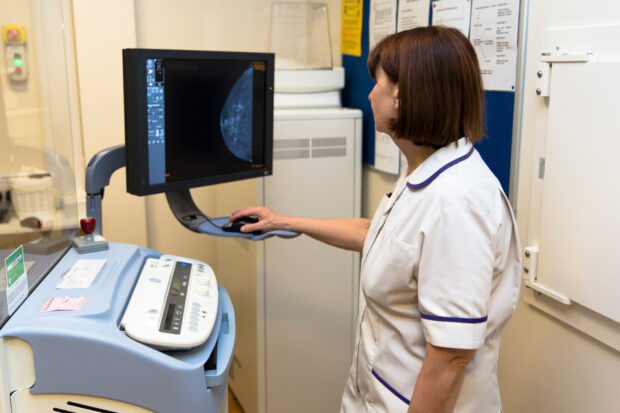
A review of the use of artificial intelligence (AI) in breast cancer screening, commissioned by the UK National Screening Committee (UK NSC), has found that humans are still better than technology at spotting possible cases of breast cancer during screening.
Find out more in the article published today in the BMJ.
Horizon-scanning
The UK NSC regularly and proactively considers advances that may lead to new screening programmes or improve current programmes. Recommendations are based on clear scientific evidence and weighing up the pros and cons to ensure that screening is beneficial for large populations but also that the potential to harm an individual person is minimised.
The UK NSC is very interested in AI, which shows promise for improving a number of screening programmes and is developing rapidly. The UK NSC has an AI task group including experts in AI, clinicians and public and patient members. They have a vital role in horizon-scanning and look at evidence for AI, concentrating on those areas where it shows most promise for early use in screening.
These include the proposed use of AI to replace a human mammogram reader in breast screening. The task group has commissioned this review of the findings of published studies in this area to understand whether the use of AI should be incorporated into the screening programme.
The work was carried out by University of Warwick screening team, led by Professor Sian Taylor-Phillips. They specialise in evidence synthesis, which means systematically bringing together the evidence from lots of different research studies to help organisations like NICE and the UK NSC make recommendations.
Findings
Whilst there is considerable potential to use AI to examine mammograms for signs of cancer, there is not yet sufficient evidence for the UK NSC to recommend its use in the NHS Breast Screening Programme.
There are several studies looking at commercially available or experimental AI systems with test cases. In these evaluations no AI systems were as good as the system of 2 expert human readers we have currently, though a few achieved similar accuracy to one reader under study conditions. There were no studies at all which showed the impact of AI in practice, and this evidence is critical for the UK NSC recommendations.
We need to know what impact the AI system will have if implemented into the screening programme, alongside humans, particularly the impact on benefits and harms to women screened.
Next steps
The UK NSC will discuss the findings of the review. This is a rapidly advancing area and the UK NSC and the AI task group will continue to review and focus on the developing evidence. The committee will look for studies that show benefit from the use of AI in the screening pathway.
This could be that it replaces scarce human experts, is more cost effective, or that it picks up more early stage cancers and reduces harm from cancer without leading to unnecessary extra investigations for women being screened. If or when AI is demonstrated to improve screening the UK NSC may recommend its adoption into the UK breast screening programme as a major modification.
The UK NSC has held an open consultation on the results of this review, and received feedback from clinicians and test manufacturers. Such feedback is used both to inform recommendations and to continuously evolve and improve the evidence review processes, ensuring they are world class.
What's really important is maintaining the excellent outcomes from the NHS Breast Screening Programme and making sure that any changes are focussed on improving the experience for all women who are screened.
UK NSC blog
The UK NSC blog provides up to date news from the UK National Screening Committee. You can register to receive updates direct to your inbox, so there’s no need to keep checking for new articles. If you have any questions about this blog article, or about the work of the UK NSC, please contact the UK NSC helpdesk.